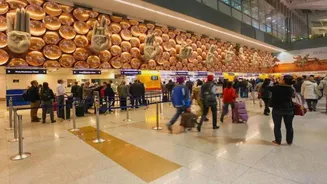A major systems crash at Delhi’s Indira Gandhi International Airport (IGIA) delayed hundreds of flights earlier this week. The question arises whether
the crash could have been avoided through prior warnings. Months before the breakdown, the Air Traffic Controllers' Guild had cautioned the authorities about the country's ageing air traffic control technology. The Air Traffic Controllers’ Guild of India (ATC Guild) had cautioned aviation authorities months ago about “performance degradation” in key automation systems, particularly at high-traffic airports like Delhi and Mumbai, warning of potential safety and efficiency issues. It had urged that the navigation systems at the airports must be periodically reviewed and upgraded to global standards. “India’s systems must align with global benchmarks such as Eurocontrol and the FAA, which emphasise predictive tools, AI-enabled conflict detection, and real-time data sharing,” the Guild had written. Further, the Parliamentary Standing Committee on Transport, Tourism and Culture had warned that automation systems at major airports, including Delhi and Mumbai, were facing "performance degradation, slowness and system lag," potentially impacting safety margins. In its 380th report on the 'Overall Review of Safety in the Civil Aviation Sector' tabled on August 20, 2025, said, "The Indian aviation system is attempting to solve a digital-age problem of traffic complexity with tools that are becoming increasingly outdated. This creates a dangerous vulnerability in what is fundamentally a human-machine system. The safety and efficiency of modern air traffic management depend on both the human and the machine components being robust and resilient." "This report has already established that the human component (the ATCOs) is under severe stress due to shortages and fatigue. This section reveals that the machine component is also failing them due to technological obsolescence," the panel had said in its August report. Airline operations at the Delhi airport, the country's busiest airport, were affected earlier this week, delaying more than 800 flights. The technical problem with the Automatic Message Switching System (AMSS), which supports the air traffic control's flight planning process, continued for over 15 hours, from around 5:45 am on Friday before the Airports Authority of India (AAI) said at around 9 pm that the issue had been addressed. In a statement, the civil aviation ministry said the system was fully restored to automatic mode by Saturday afternoon and that there were no flight cancellations on Saturday owing to the issue.












